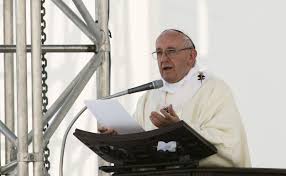The Synod on Youth has closed, after approving the final document in accord with the new rules on Episcopal Synods promulgated by Pope Francis just last month, Episcopalis communio, which updated, and strengthened the authority of these meetings of bishops, first approved by Pope Paul VI during the closing days of the Second Vatican Council. A ‘synod’, from the Greek to ‘walk the same road’ (syn-hodos) is, or was, a non-authoritative, and usually smaller, gathering of bishops than a full ecumenical council, with what was mostly seen as a consultative role. The Pope would then write a ‘post-synodal’ apostolic letter, such as Familiaris Consortio or, yes, Amoris Laetitia.
The new document now permits the document immediately resulting from the Synod as part of the ‘authentic Magisterium’, at the discretion of the Holy Father. As Father Raymond de Souza explains, the bishops at the Synod had no time to sift, digest and discern what they were approving, the 30,000 word text read to them in Italian, with hard copies given only just before.
To put this into context, it took four years, each year with four months of intense working sessions, to compose, discuss, sift and approve the sixteen documents of the Second Vatican Council.
One is left with a nagging question, with whatever this document says (and more on that later): Why the rush?
And, as the Synod closes, we also remember the victims of the shooting of the synagogue in Pittsburgh, when a deranged and disgruntled man, who somehow thought that Jews were causing many of the problems in America, shot up a prayer service on Saturday, killing eleven, and wounding a number of others, including four police officers, before himself being shot and taken into custody. God rest the souls of the victims, and grant healing.
This, along with the recent ‘pipe bomb’ scare, has further fractured an already divided America, heading into midterm elections next week. Was this disturbed man a Trump supporter, or not? Is Trump’s ‘strong language’ to blame for inciting passions? Yet there are any number of examples of ‘strong language’ from the Democrats as well, and, as far as I know, no one has incited anyone to murder. Who is to say what is ‘in bounds’, and what is not?
Speech is a difficult, even impossible, thing for state functionaries to control, and a dangerous road to trod. The fundamental right to freedom of speech is a bedrock of any sane and well-functioning society: As Mark Steyn has pointed out more than once, 1930’s Germany had some of the most strict anti-Semitic speech laws on record, and Hitler’s Mein Kampf was verboten. All this did was make the evil simmer and go underground, make it more palatable by being forbidden, if you will. Best to bring what evil there be out into the open, so it can be debated, and defeated with the inestimable power of truth.
On the note of free speech, pray for LifeSite news, which has been threatened by their server with immediate shut-down. This, in response to complaints from one Adam Flanders, citing their ‘hateful’ content, especially towards him. One would think that speech would be more free in this internet age, when things don’t have to go through actual printers, but, in fact, the flow of information is becoming ever-more bottlenecked, funnelled through monolithic giants like Google and FaceBook which have not, shall we say, demonstrated a great love of the truth, or at least certain kinds of truths that may make some complacent consciences uneasy. One wonders why Google recently dropped its initial motto of ‘Don’t Be Evil’.
And on not being evil, the one thing people can, and should, control is their own ‘free-will’, that God-like spiritual power which no power in heaven or earth, besides ourselves and God, can move. This would include what we ourselves think, say or do. As Moses pointed out all those years ago, we are free to choose good or evil, the way of life or the way of death. Sadly, all too many trod the latter path to destruction and mayhem, while others go along in a complaisant manner, and we cannot fully exculpate ourselves.
This same principle holds, in an analogous way, for the youth of the Church, who, whatever their ‘inclinations’ (and we all, youth included, have at least some inclination to sin) are free to choose the higher path, to virtue, chastity, generosity, kindness and a sacrificial love that sees what good there be in others, in their arguments, to seek common ground, and lead ourselves and them, suaviter et fortiter, to the truth, by the light of reason and grace.










